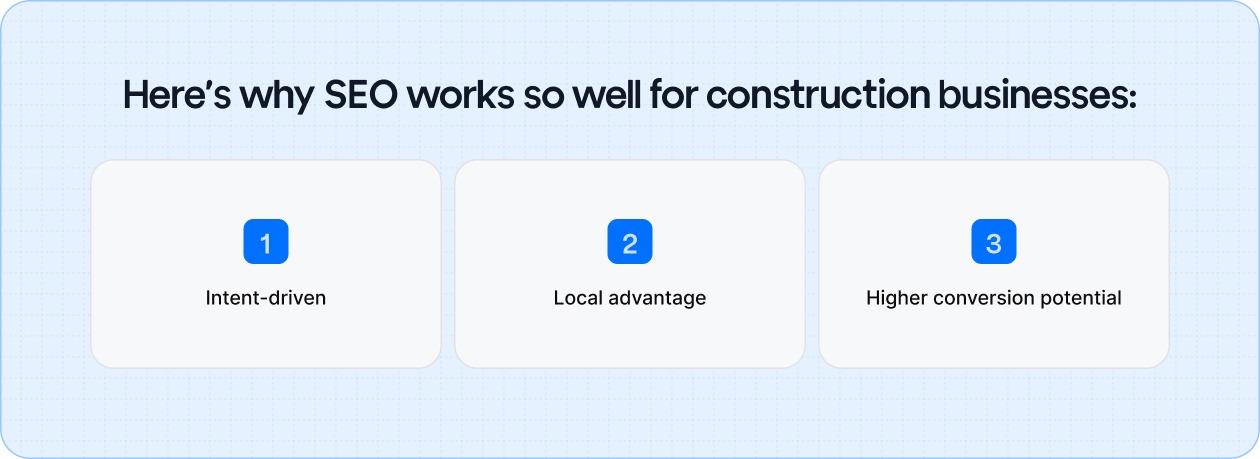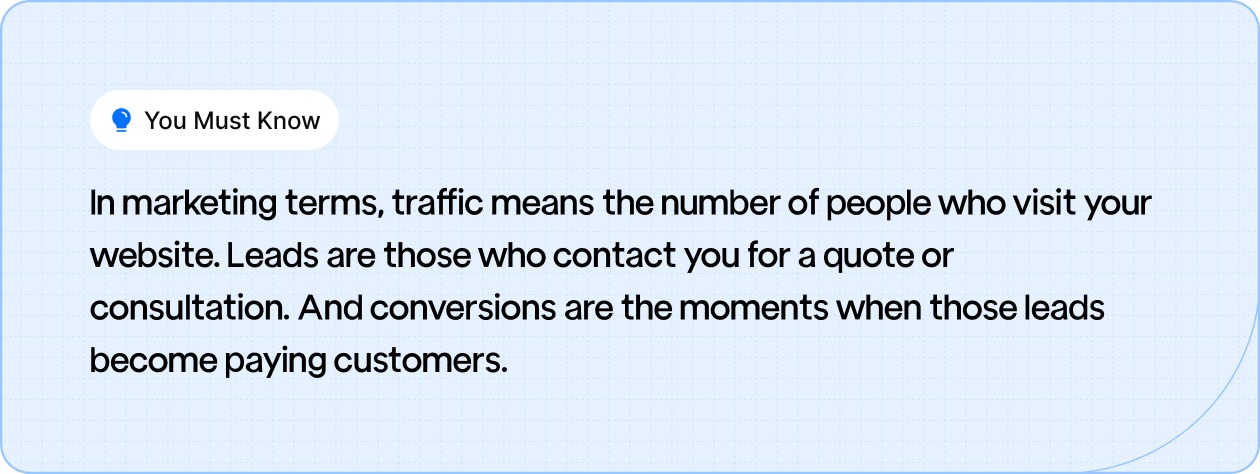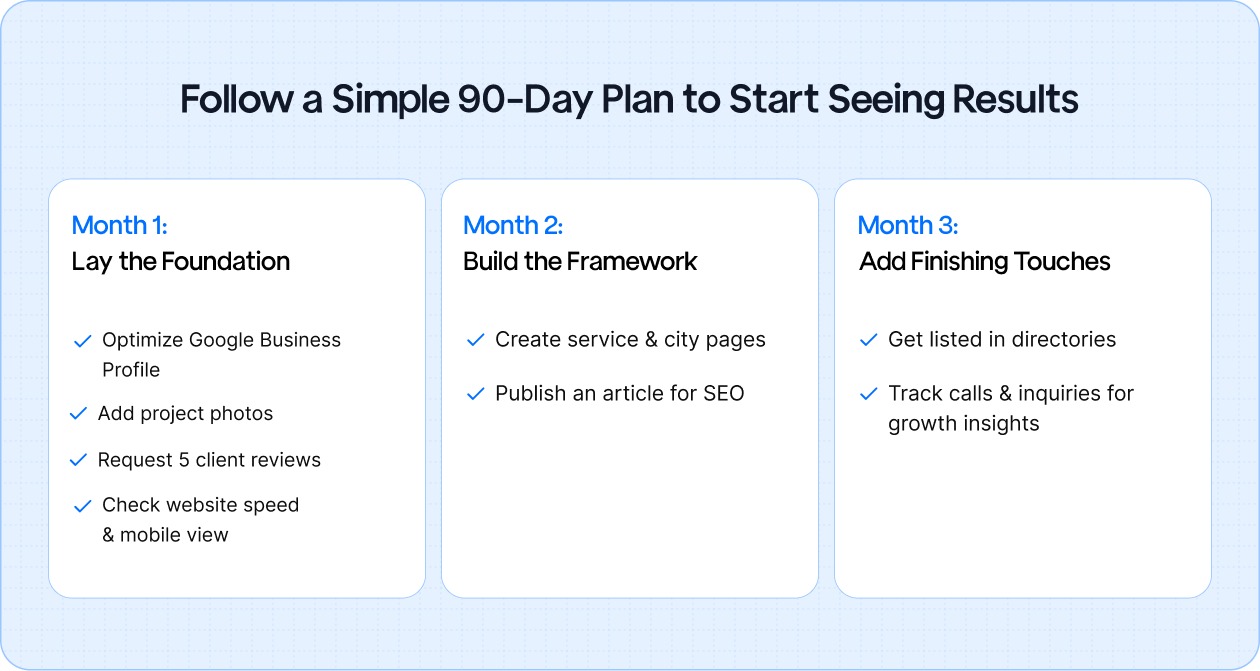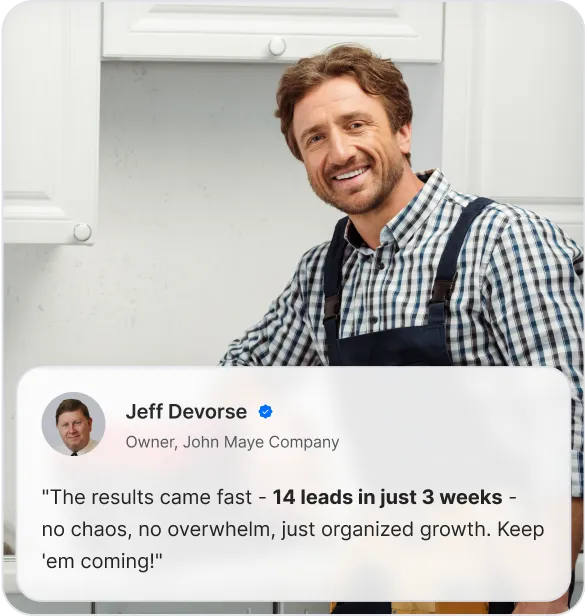Running a construction company today means competing both on job sites and online. Property owners and developers increasingly search online to find contractors, which makes your online presence a key factor in winning business. That’s where SEO for construction companies becomes crucial.
By mastering SEO, you ensure your company appears at the top of search results, helping you attract more inquiries and secure more projects.
This guide will discuss 8 straightforward strategies that will help your company stand out and win more work.
What SEO Really Means for Construction Companies?
Two construction businesses can have the same skills, experience, and satisfied clients, yet one consistently receives project inquiries online while the other waits for word-of-mouth referrals. The reason behind this gap is simple: visibility.
That visibility comes from SEO, or Search Engine Optimization, the process of improving your website so that Google recommends it when people search for services like “commercial builders near me” or “home renovation contractors in Texas.” It’s how potential clients find you before they ever make a call.
Here’s why SEO works so well for construction businesses:

- Intent-driven: When people find your site via a search engine, they have already identified a problem, such as the need for a renovation or construction project, and are searching for the right provider to help them.
- Local advantage: Many of these searchers are looking for local services, which means you show up exactly when they're looking to make a decision. This increases your chances of converting that searcher into a paying client.
- Higher conversion potential: Unlike social media, which often focuses on awareness or engagement, SEO drives people who are more likely to take action. These individuals are already further down the decision-making process, making them much more likely to hire you.
Why this matters:
- SEO = Immediate Relevance: You show up exactly when potential clients are ready to make decisions.
- Social media = Awareness: While social media can build awareness, it doesn’t always translate into immediate action or sales.
By focusing on SEO, your construction business has the chance to attract clients who are actively looking for your services, making it a much more predictable and effective lead source than social media.

8 Key Strategies to Improve Your Construction Marketing and Get More Customers
To build a strong online presence and attract more clients, construction companies need to focus on key marketing strategies that improve visibility and establish trust.
From optimizing local listings to creating a user-friendly website, these 8 strategies will ensure your business stands out in a competitive market and drives real leads.
1. Improve Your Local Visibility with Google Business Profile and Apple Business Connect
Most construction companies rely on word-of-mouth, but clients now search online before choosing who to hire. When someone looks up "office builder near me" or "home renovation in Chicago," Google decides which businesses appear first. And those businesses get the calls, quotes, and contracts.
To earn that spot, start with the foundation, your Google Business Profile (GBP). Don’t forget, Apple Business Connect also plays a crucial role in local SEO, especially in regions where Apple Maps is used for location-based searches.
- Fill in accurate business information, business name, address, contact details, and service hours.
- Add real photos of your projects, crews, and office. Authentic visuals build trust.
- Ensure NAP consistency across all online listings and directories. A mismatch in your name, address, or phone number across the web can hurt your rankings.
Once your profile is ready, strengthen it:
- Ask happy clients for reviews: Every positive review is like a public referral that boosts your credibility and local ranking.
- Stay active: Post new project photos, quick updates, or short insights about your work. Google notices consistent engagement and rewards it with visibility.
When your business details are complete, accurate, and active, your profile works as your digital word-of-mouth, visible to every client searching in your area.
2. Design a Construction Website That Turns Visitors into Customers with SEO
Your website is often the first impression before a client ever makes a call. It should feel like walking into your office, clear, professional, and reassuring. A strong construction website answers three questions instantly:
- What do you build?
- Where do you work?
- How can clients reach you?
Service Pages: Build separate pages for each service you offer, residential construction, commercial projects, roofing, renovations, etc. Each page should explain your process, the scope of work, and what makes your approach reliable.
This type of organized content structure helps both users and Google navigate your offerings, making it easier for potential clients to find exactly what they need.
A clear content hierarchy:
- Service Pages
- Project Portfolios
- Blogs
This ensures both Google and your visitors understand the structure of your website. This makes your site easier to navigate and allows Google to index your pages more effectively, helping you rank higher for relevant keywords.
Lastly, ensure that your website is mobile-friendly and fast-loading. Many potential clients browse on mobile, and a slow or confusing layout can cost you inquiries even before someone reads your offer.
This is why website speed, security (HTTPS), and responsiveness are critical elements of your SEO for construction companies' strategy.
3. Use Project Pages to Turn Visitors into Real Leads
Every completed project tells a story of challenges solved, timelines met, and trust earned. Yet many construction companies leave those stories untold, hidden in photo folders or client emails. When shared the right way, each project can bring in your next big client.
Create dedicated project pages that walk potential clients through your work. Start with the client’s challenge, maybe an outdated office space, a leaking roof, or a commercial expansion. Then explain how you approached it:
- Outline the project scope, materials, and construction method.
- Mention the timeline and any special requirements you handled.
- Add before-and-after photos to showcase transformation and results.
- Include a short testimonial from the client to reinforce credibility.
These project pages display your work; they show proof of reliability, quality, and experience. Plus, when written naturally, they include local keywords that help you rank higher on Google without forced optimization.
The more specific and authentic your project stories are, the more likely potential clients will see themselves in them and reach out for their next build.
4. Write Helpful Content That Builds Trust and Search Rankings
Most potential clients start with questions, not quotes. They want to know how long a renovation might take, what permits they’ll need, or how much a new warehouse could cost. When your website provides those answers, you become their first trusted source, long before they decide who to hire.
Use your blog or FAQ section to address real, everyday client questions, such as:
- “What permits are required for commercial construction in New York?”
- “How much does a home renovation cost in San Francisco?”
- “What affects the timeline for an industrial project?”
This type of content serves two purposes. It helps people feel informed, and it helps Google recognize your website as an authority in your field. The more helpful and consistent your content is, the higher your chances of appearing when someone searches for construction help in your area.
When clients find clear, honest information on your site, they associate your business with credibility and expertise. That trust often turns a reader into your next inquiry.
5. Earn Mentions from Reputable Construction and Local Websites to Strengthen Your SEO
Every time another website links to yours, it acts as a digital referral. Just as a satisfied client recommending you to a neighbor builds trust in the real world, backlinks from credible sources build trust online, both with potential clients and with Google.
Start with connections you already have:
- Industry platforms like Houzz, Angi, or regional business directories
- Partners and collaborators, like material suppliers, architects, or subcontractors, who can reference your work
- Local recognition through press releases or articles like "Top Construction Companies in Dallas."
These authentic, local backlinks help strengthen your reputation and SEO for construction companies.
6. Make Technical Improvements That Help Google Rank Your Site
You would never hand over a building plan with weak foundations; the same rule applies to your website. Behind every great-looking site is solid technical work that ensures it’s fast, secure, and easy to navigate for both visitors and search engines. Here’s how to build a strong digital foundation:
Website speed:
- If your pages take longer than 3 seconds to load, potential clients will often leave before they even see your projects.
- Compress large images, especially high-resolution site photos, to improve performance without losing quality.
Security:
- Use HTTPS to protect visitor data. This builds trust with your clients and signals to search engines that your site is secure.
- A secure website is a crucial factor in both client confidence and ranking.
Mobile compatibility:
- With most people browsing on their phones, a slow or broken mobile layout can cost you valuable leads.
- Test how your website looks and functions on different devices to ensure it’s responsive and user-friendly.
Navigation:
- Make your website easy to use with clear menus, logical page links, and easily accessible contact buttons.
- The simpler and more intuitive the navigation, the better the user experience, which can increase client engagement.
By focusing on these technical elements, you’ll create a website that both visitors and search engines can navigate with ease, helping you keep clients engaged and improving your online visibility.
Must Read: 15 Proven Construction Industry Marketing Strategies for Business Growth
7. Show Proof That Clients and Google Can Trust You
Trust is the foundation of every successful construction project, and your online presence should reflect the same strength. Before a client decides to call, they look for signals that prove your credibility. Google does too.
Start by giving both clients and search engines solid proof of who you are and what you stand for:
- Display your credentials clearly: Licenses, insurance, and safety certifications speak louder than promises. They show your business operates responsibly.
- Use genuine visuals: Share real photos of your worksites, crews, and finished projects instead of stock images. Authentic visuals create emotional connection and confidence.
- Highlight recognition: Showcase awards, associations, and professional memberships. They validate your reputation in your industry and community.
- Let clients speak for you: A short testimonial from a satisfied customer builds more trust than any tagline ever could.
These proof points help Google understand your authority and reassure potential clients that your company delivers exactly what it promises. When visitors feel that credibility, they stay longer, engage deeper, and reach out faster.
8. Track Results Without Complicated Tools
You would never pour concrete without checking the measurements first; the same logic applies to your marketing. Tracking results shows which efforts actually bring clients through the door and which ones need adjustment.
You don’t need expensive software to do it. A few free tools can tell you almost everything you need to know:
- Google Analytics helps you see how many people visit your website and which pages attract the most interest. If certain pages bring in more quote requests, you know what’s working.
- Google Business Profile Insights shows real actions, such as how many people called, messaged, or asked for directions after finding your business online.
- Focus on what truly matters: calls, inquiries, and confirmed projects, not vanity metrics like clicks or impressions.
By checking these numbers once or twice a month, you’ll know exactly where your next client is coming from. That insight helps you spend time and money on what delivers real results.
Follow a Simple 90-Day Plan to Start Seeing SEO Results

Every strong build starts with a clear timeline; SEO is no different. When you treat your online presence like a project plan, you can measure progress, track milestones, and see steady growth within just 90 days.
Month 1: Lay the Foundation
Your first month is all about groundwork.
- Claim and fully optimize your Google Business Profile.
- Add new project photos that show your quality and attention to detail.
- Ask at least five clients for honest reviews to increase trust and local visibility.
- Check your website speed and mobile view; your digital foundation must be solid.
Month 2: Build the Framework
Now that you’re visible, strengthen your structure.
- Create separate service and city pages with clear, well-written descriptions.
- Publish one valuable article that answers a question your clients often ask. This builds authority and helps you rank higher.
Month 3: Add the Finishing Touches
The final stage focuses on visibility and measurement.
- Get listed in reputable directories and industry associations.
- Track your calls, quote requests, and inquiries to see where growth is coming from.
By the end of this plan, you’ll have a digital presence strong enough to attract clients consistently, and data to show what’s working best.
Build Long-Term Growth with SEO for Construction Companies
SEO lays that groundwork, helping people find you, trust you, and choose you long before they ever pick up the phone.
When your listings are optimized, your content speaks to real client needs, and your projects are showcased with pride, your website becomes more than a digital presence; it becomes your strongest business partner. Over time, that steady visibility brings in consistent leads, repeat clients, and the kind of growth that keeps your schedule full year-round.






















.webp)








.webp)
.svg)


.svg)
.svg)
.svg)




.svg)




.svg)